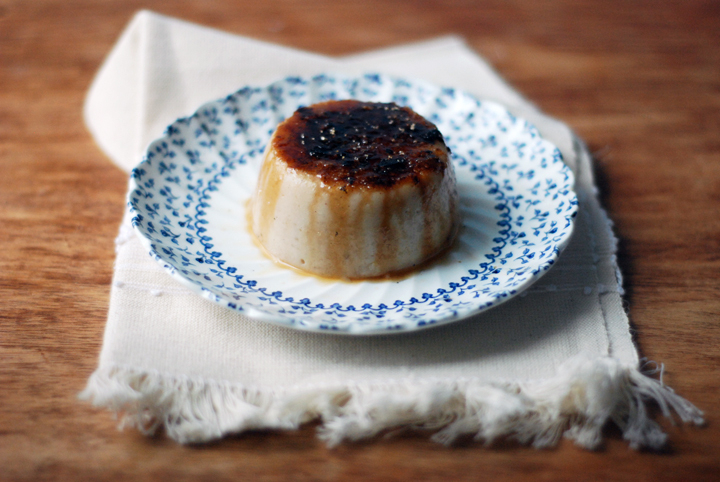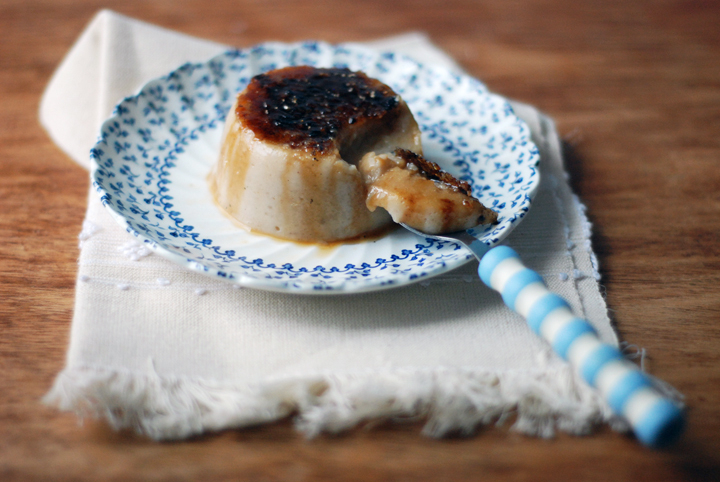(eggless and dairy-free) Crème Brûlée
I’ll start this post by sharing with you some of the kitchen disasters that have happened around here lately. The first one happened a couple days ago, when I attempted to make some hazelnut cookies: some minutes after I’ve put them in the oven, we heard some noises coming from the oven, and in the end it turned out one of the oven glasses has broken. Surprisingly, the cookies weren’t affected and were still edible.
The second disaster happened a few days later: I was working on this crème brûlée recipe and used the food processor to blend all the ingredients I was going to use; suddendly, when trying to pull out the blender jar, all the liquid spilled away on the floor – perhaps I didn’t attach the jar properly to its base? After cleaning the kitchen floor, table and counter, I was determined to start over again – I wanted crème brûlée and, whatever happened next, I’d have my serving of it that night.
This créme brulée fever has triggered thanks to the MasterChef Australia (a TV show I’m completely addicted to, by the way) as in one of the shows I watched recently, the contestants were taught, in a masterclass, how to perfectly make the said dessert. I never cared too much for crème brûlée, but the moment I saw and heard on the show that burnt sugar surface crackling with the hit of the spoon, I was determined to make my own version of the french classic. The MasterChef recipe, even though looking (and certainly tasting) incredible, relied on eggs to get that pudding like texture – soft, smooth, but somehow solid. My purpose, when attempting at making an eggless version, was to achieve a similar consistency as it is nearly all crème brûlée is about. Arrowroot flour and agar agar flakes were then used in order to give creaminess and structure to this vanilla flavored custard; to finish things off, a good layer of golden and sort of smokey-tasting sugar was added, for extra sweetness and yumminess.
(eggless and dairy-free) Crème Brûlée
(for 5 sevings)
ingredients:
4 cups (1 liter) non-dairy milk (I used soy milk, but almond milk would work as well)
1/3 cup (65 grams) muscovado sugar (plus extra, for the topping)
4 ½ tablespoons arrowroot flour
1 3/4 teaspoons agar agar flakes
1 ½ teaspoons vanilla extract
1 cinnamon stick
Notes: I’ve used agar agar flakes in here, and even though I’ve blended all the ingredients in the food processor before actually start cooking (as it’s suggested below), I could still feel some little pieces of agar which haven’t been blended properly. They were so few I actually didn’t mind, but if you want to avoid this, use powdered agar instead – you have to use less, I’d say ¾ to 1 teaspoon (I haven’t tested, so this is merely referential). On the other hand, feel free to use a vanilla bean (split in half, lengthwise, seeds scrapped straight into the pot) instead of vanilla extract.
1. Put all the ingredients in a food processor or vitamix and mix, at medium-high speed, for 30 seconds, or until everything is well blended.
2. In a large pot over medium heat, pour the mixture and stir with a spoon, until it barely starts boiling. It might happen that some scum forms on the surface – you can skim it off easily with a metal spoon. As soon as the liquid is boiling, decrease the heat to low and continue to whisk vigourously for 10 to 12 minutes longer. The mixture should thicken up substancially and you’ll know it’s ready when, while stirring, the spoon leaves trail marks, showing off the bottom of the pot.
3. Divide the créme brulée among 5 ramekins, and let them cool at room temperature. Once cooled, refrigerate for at least 30 minutes.
4. To make the “burnt” topping, add 1 tablespoon of sugar on top of each serving and, using a kitchen torch, caramelize the sugar, working in circular moves. Add up to 1 more tablespoon of sugar to each rameking, if you want a slightly more thick topping.
5. Let it set for 5 minutes before serving. Bon appetit!


5 comments